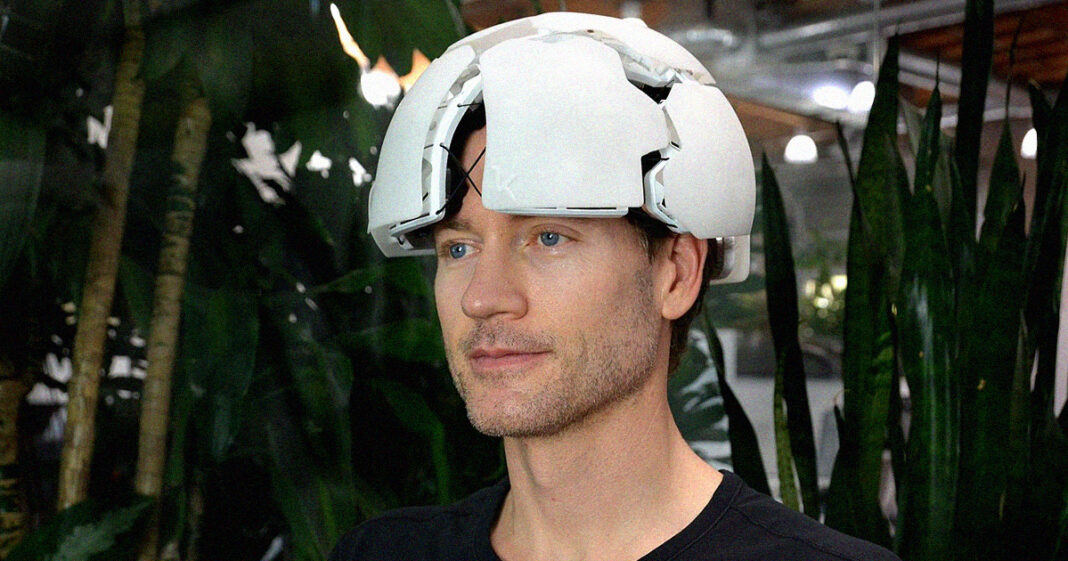Researchers anticipate using the Kernel helmet to gain insight into brain aging and mental disorders, and even mechanics behind metaphysical experiences like psychedelic trips.
Over the next few weeks, a company called Kernel will begin sending dozens of customers across the US a $50,000 (roughly Rs. 37 lakhs) helmet that can, crudely speaking, read their mind. Weighing a couple of pounds each, the helmets contain nests of sensors and other electronics that measure and analyse a brain’s electrical impulses and blood flow at the speed of thought, providing a window into how the organ responds to the world. The basic technology has been around for years, but it’s usually found in room-size machines that can cost millions of dollars and require patients to sit still in a clinical setting.
The promise of a leagues-more-affordable technology that anyone can wear and walk around with is, well, mind-bending. Excited researchers anticipate using the helmets to gain insight into brain aging, mental disorders, concussions, strokes, and the mechanics behind previously metaphysical experiences such as meditation and psychedelic trips. “To make progress on all the fronts that we need to as a society, we have to bring the brain online,” says Bryan Johnson, who’s spent more than five years and raised about $110 million (roughly Rs. 815 crores) —half of it his own money—to develop the helmets.
Johnson is the chief executive officer of Kernel, a startup that’s trying to build and sell thousands, or even millions, of lightweight, relatively inexpensive helmets that have the oomph and precision needed for what neuroscientists, computer scientists, and electrical engineers have been trying to do for years: peer through the human skull outside of university or government labs. In what must be some kind of record for rejection, 228 investors passed on Johnson’s sales pitch, and the CEO, who made a fortune from his previous company in the payments industry, almost zeroed out his bank account last year to keep Kernel running. “We were two weeks away from missing payroll,” he says. Although Kernel’s tech still has much to prove, successful demonstrations, conducted shortly before COVID-19 spilled across the globe, convinced some of Johnson’s doubters that he has a shot at fulfilling his ambitions.
A core element of Johnson’s pitch is “Know thyself,” a phrase that harks back to ancient Greece, underscoring how little we’ve learned about our head since Plato. Scientists have built all manner of tests and machines to measure our heart, blood, and even DNA, but brain tests remain rare and expensive, sharply limiting our data on the organ that most defines us. “If you went to a cardiologist and they asked you how your heart feels, you would think they are crazy,” Johnson says. “You would ask them to measure your blood pressure and your cholesterol and all of that.”
The first Kernel helmets are headed to brain research institutions and, perhaps less nobly, companies that want to harness insights about how people think to shape their products. By 2030, Johnson says, he wants to bring down the price to the smartphone range and put a helmet in every American household—which starts to sound as if he’s pitching a panacea. The helmets, he says, will allow people to finally take their mental health seriously, to get along better, to examine the mental effects of the pandemic and even the root causes of American political polarisation. If the Biden administration wanted to fund such research, Johnson says, he’d be more than happy to sell the feds a million helmets and get started: “Let’s do the largest brain study in history and try to unify ourselves and get back to a steady state.”
Johnson is something of a measurement obsessive. He’s at the forefront of what’s known as the quantified-self movement. Just about every cell in his body has been repeatedly analysed and attended to by a team of doctors, and their tests now cast him as a full decade younger than his 43 years. Along those lines, he wants to let everyone else analyse, modify, and perfect their minds. No one knows what the results will be, or even if this is a good idea, but Johnson has taken it upon himself to find out.
Unlike many of his tech-millionaire peers, Johnson grew up relatively poor. Born in 1977, he was raised in Springville, Utah, the third of five children. “We had very little and lived a very simple life,” says his mother, Ellen Huff. A devout Mormon, she stayed home with the kids as much as possible and earned a modest income from a rental unit on the other side of the family’s duplex.
Johnson remembers his mother knitting his clothes and grinding wholesale batches of wheat to make bread. “We were not like my friends,” he says. “They would buy things from stores, and we just did not do that.” His dad, a trash collector turned lawyer, had a drug problem and an affair, which led to his divorce from Huff. Later, delinquent child support payments, missed pickups on the weekends, and legal troubles contributed to his disbarment. “After some time of challenge, my father successfully overhauled his life 20 years ago,” Johnson says. “Throughout his struggles, we remained close and without conflict. He has been a unique source of wisdom, counsel, and stability in my life.”
Johnson had little idea what to do with his life until he served a two-year church mission in Ecuador, where he interacted with people living in huts with dirt floors and walls made of mud and hay. “When I came back, the only thing I cared about was how to do the most good for the most people,” he says. “Since I didn’t have any skills, I decided to become an entrepreneur.”
While at Brigham Young University, he started his own business selling cellphones and service plans, making enough money to hire a team of salespeople. After that, he invested in a real estate development company that collapsed and left him $250,000 (roughly Rs. 1.8 crores) in debt. To get out of the hole, he took a job selling credit card processing services to small businesses door to door. Soon he was the company’s top salesman.
This was the mid-2000s, and Johnson’s customers kept complaining about the hassle of setting up and maintaining credit card payment systems on their websites. In 2007 he started Braintree, a software company focused on easing the process with slick interfaces. It succeeded—and had good timing. After signing up a slew of restaurants, retailers, and other small businesses, Braintree became the middleman of choice for a profusion of startups premised on ordering services online, including Airbnb, OpenTable, and Uber. The company also made a great bet on mobile payments, acquiring Venmo for only $26 million (roughly Rs. 190 crores) in 2012. The next year, eBay bought Braintree for $800 million in cash, a little less than half of which went to Johnson.
Despite his newfound fortune, Johnson felt miserable. He was stressed out and overweight. He’d gotten married and had kids at a young age, but his marriage was falling apart, and he was questioning his life, religion, and identity. He says he entered a deep depressive spiral that included suicidal thoughts.
The decision to sell Braintree well before it peaked in value had been motivated in part by Johnson’s need to change those patterns. “Once I had money, it was the first time in my life that I could eliminate all permission structures,” he says. “I could do whatever I wanted.” He broke with the Mormon church, got divorced, and moved from Chicago, where Braintree was headquartered, to Los Angeles to start over.
Arriving in California, Johnson consulted with all manner of doctors and mental health specialists. His bodily health improved with huge changes to his diet, exercise, and sleep routines. His mind proved a tougher puzzle. He meditated and studied cognitive science, particularly the ways people develop biases, in an effort to train himself to think more rationally. By late 2014 he was convinced his wealth would be best spent advancing humanity’s understanding of the brain. He took a large portion of his windfall and started OS Fund, a venture firm that has invested in several artificial intelligence and biotech companies. These include Ginkgo Bioworks, Pivot Bio, Synthego, and Vicarious, some of the most promising startups trying to manipulate DNA and other molecules.
Mostly, though, Johnson staked his fortune on Kernel. When he founded the company, in 2015, his plan was to develop surgical implants that could send information back and forth between humans and computers, the way Keanu Reeves downloads kung fu into his brain in The Matrix. (In the early days, Johnson discussed a potential partnership with Elon Musk, whose company Neuralink. has put implants in pigs and monkeys, but nothing came of it.) The idea was, in part, to transfer thoughts and feelings directly from one consciousness to another, to convey emotions and ideas to other people more richly than human language allows.
Perhaps more important, Johnson reckoned, AI technology was getting so powerful that for human intelligence to remain relevant, the brain’s processing power would need to keep pace.













![Hotstar Premium Cookies 2019 [*100% Working & Daily Updated*] Hotstar Premium Cookies 2019 [*100% Working & Daily Updated*]](https://tahav.com/wp-content/uploads/2019/11/Hotstar-Premium-Cookies-Free-100x70.jpg)



